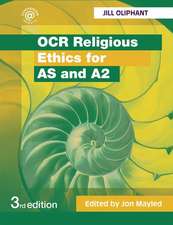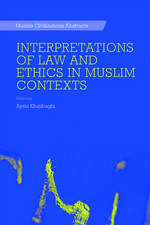The Nasirean Ethics (RLE Iran C): Routledge Library Editions: Iran
Autor Nasīr ad Dīn Tūsi Traducere de G. M. Wickensen Limba Engleză Paperback – 27 noi 2023
| Toate formatele și edițiile | Preț | Express |
|---|---|---|
| Paperback (1) | 260.86 lei 3-5 săpt. | +30.61 lei 4-10 zile |
| Taylor & Francis – 27 noi 2023 | 260.86 lei 3-5 săpt. | +30.61 lei 4-10 zile |
| Hardback (1) | 1280.14 lei 6-8 săpt. | |
| Taylor & Francis – 25 feb 2011 | 1280.14 lei 6-8 săpt. |
Din seria Routledge Library Editions: Iran
- 35%
 Preț: 994.05 lei
Preț: 994.05 lei -
 Preț: 356.75 lei
Preț: 356.75 lei - 36%
 Preț: 821.82 lei
Preț: 821.82 lei - 38%
 Preț: 765.40 lei
Preț: 765.40 lei - 36%
 Preț: 824.17 lei
Preț: 824.17 lei -
 Preț: 327.21 lei
Preț: 327.21 lei - 37%
 Preț: 621.93 lei
Preț: 621.93 lei - 36%
 Preț: 992.06 lei
Preț: 992.06 lei - 36%
 Preț: 849.11 lei
Preț: 849.11 lei - 37%
 Preț: 622.63 lei
Preț: 622.63 lei - 35%
 Preț: 1052.40 lei
Preț: 1052.40 lei - 18%
 Preț: 1058.69 lei
Preț: 1058.69 lei - 38%
 Preț: 763.97 lei
Preț: 763.97 lei - 36%
 Preț: 823.44 lei
Preț: 823.44 lei - 35%
 Preț: 994.76 lei
Preț: 994.76 lei - 18%
 Preț: 993.55 lei
Preț: 993.55 lei - 32%
 Preț: 338.42 lei
Preț: 338.42 lei - 38%
 Preț: 764.87 lei
Preț: 764.87 lei - 28%
 Preț: 240.07 lei
Preț: 240.07 lei - 38%
 Preț: 764.87 lei
Preț: 764.87 lei - 36%
 Preț: 993.14 lei
Preț: 993.14 lei - 18%
 Preț: 998.77 lei
Preț: 998.77 lei - 38%
 Preț: 762.36 lei
Preț: 762.36 lei - 36%
 Preț: 823.99 lei
Preț: 823.99 lei - 38%
 Preț: 765.59 lei
Preț: 765.59 lei - 36%
 Preț: 822.18 lei
Preț: 822.18 lei - 28%
 Preț: 276.08 lei
Preț: 276.08 lei - 35%
 Preț: 993.51 lei
Preț: 993.51 lei - 38%
 Preț: 764.87 lei
Preț: 764.87 lei - 36%
 Preț: 821.65 lei
Preț: 821.65 lei - 36%
 Preț: 823.26 lei
Preț: 823.26 lei - 36%
 Preț: 824.53 lei
Preț: 824.53 lei -
 Preț: 398.18 lei
Preț: 398.18 lei - 36%
 Preț: 992.06 lei
Preț: 992.06 lei - 36%
 Preț: 821.46 lei
Preț: 821.46 lei - 18%
 Preț: 1341.06 lei
Preț: 1341.06 lei
Preț: 260.86 lei
Nou
Puncte Express: 391
Preț estimativ în valută:
49.93€ • 54.25$ • 41.97£
49.93€ • 54.25$ • 41.97£
Carte disponibilă
Livrare economică 31 martie-14 aprilie
Livrare express 14-20 martie pentru 40.60 lei
Preluare comenzi: 021 569.72.76
Specificații
ISBN-13: 9781032547091
ISBN-10: 103254709X
Pagini: 352
Dimensiuni: 156 x 234 x 24 mm
Greutate: 0.66 kg
Ediția:1
Editura: Taylor & Francis
Colecția Routledge
Seria Routledge Library Editions: Iran
Locul publicării:Oxford, United Kingdom
ISBN-10: 103254709X
Pagini: 352
Dimensiuni: 156 x 234 x 24 mm
Greutate: 0.66 kg
Ediția:1
Editura: Taylor & Francis
Colecția Routledge
Seria Routledge Library Editions: Iran
Locul publicării:Oxford, United Kingdom
Public țintă
Postgraduate, Undergraduate, and Undergraduate AdvancedCuprins
Translator’s Introduction. A: Work’s Significance and Special Quality B: Tūsī’s Life and Writings C: The Present Rendering D: The Work’s Style E: Purpose of Present Vision F: Acknowledgements G: Bibliography Author’s Preamble. Exordium. Circumstances of Composition. Prolegomena. Scheme of Work. First Discourse: On Ethics First Division: On Principles 1. Elementary Principles 2. The Human or Rational Soul 3. The Faculties of the Human Soul 4. Man, the Noblest Being 5. The Soul’s Perfection and Deficiency 6. Wherein Lies the Soul’s Perfection 7. On Good, Felicity and Perfection Second Division: On Ends 1. Limit, Nature and Alterability of Disposition 2. Noblest of Disciplines is Correction of Dispositions 3. Classes of Virtue and Excellences of Dispositions 4. Species Within Classes of Virtues 5. Types of Vices 6. Virtues and Pseudo-Virtues 7. Justice, Noblest of All Virtues 8. Acquisition of Virtues and Degrees of Felicity 9. Preserving the Soul’s Health 10. Treating the Soul’s Sicknesses Second Discourse: On Economics 1. On Households In General 2. Regulation of Property and Provisions 3. Regulation of Wives 4. Regulation of Children 4a. Regulation of Parents 5. Government of Servants and Slaves Third Discourse: On Politics 1. Need for Civilization and Nature of Politics 2. On Love, Connector of Societies 3. Divisions of Societies and Conditions of Cities 4. Government of Realm and Manners of Kings 5. Government of Retainers and Manners of King’s Followers 6. On Friendship and Friends 7. How to Deal with Different Classes of Mankind 8. Testaments Attributed to Plato.
Recenzii
Review of the original edition of The Nasirean Ethics: 'Provided with an excellent introduction...note...and a very useful index, this translation is doubtless the best book yet published in any Western language supplying first-hand material for future research on Tūsī and his ethics.' Heshmat Moayyad, Journal of Near Eastern Studies, Vol 31, No. 3.
Notă biografică
Nasīr ad-Dīn Tūsī was a 13th Century Persian polymath. G. M. Wickens was the Founding Chair of the Department of Islamic Studies at the University of Toronto, Canada.
Descriere
The Nasirean Ethics is the best known ethical digest to be composed in medieval Persia. This work is primarily concerned with the criteria of human behaviour: first in terms of space and priority allotted, at the individual level, secondly, at the economic level and thirdly at the political level.

















